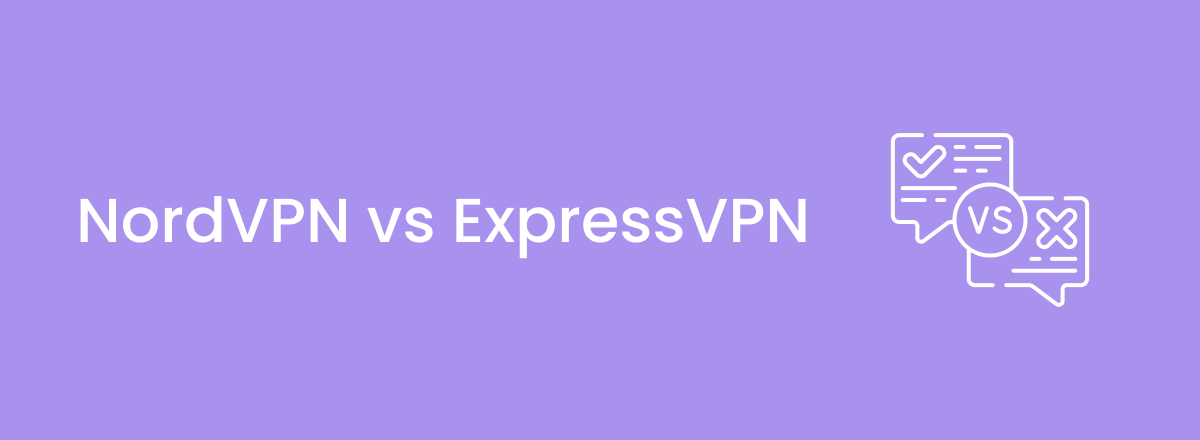ExpressVPN and NordVPN are two of the most popular VPNs on the market and understandably, it can be hard to decide which one to use. Both are good options whether you’re looking to stream geo-restricted content or keep your data secure while using a public Wi-Fi, but there are some things one is better at than the other.
The factors I took into consideration while comparing NordVPN vs ExpressVPN include privacy, security, streaming capabilities, number of devices, and more.
If you’re in a hurry, I've added a table below that summarizes the differences between NordVPN and ExpressVPN.
Overview: ExpressVPN vs NordVPN
 |
 |
|
|---|---|---|
| Rating | ||
| Overall rank | #1 of #16 | #3 of 16 |
| No logs policy | Yes, audited | Yes, audited |
| Pricing | from $2.99/month | from $3.49/month |
| Protocols | NordLynx, OpenVPN, IKEv2/IPsec | Lightway, OpenVPN, IKEv2, L2TP/IPSec |
| Streaming services | Netflix, HBO Max, Hulu, BBC iPlayer, and others | Netflix, Hulu, Disney+, HBO Max and more |
| Connections | 10 | 14 |
| Support | 24/7 live chat support | 24/7 live chat support |
| Servers and countries | 8,300+ servers in 129 countries | 3,000+ servers in 105 countries |
 Winner:NordVPN |
ExpressVPN vs. NordVPN: encryption & security
While NordVPN offers robust security features, ExpressVPN stands out with its unique approach to encryption and security. ExpressVPN utilizes AES-256 and wolfSSL encryption protocols, offering an equally secure, yet faster and more efficient performance compared to NordVPN's more common approach. Additionally, ExpressVPN's proprietary protocol provides enhanced security without compromising on speed. Its kill switch, known as 'Network Lock', ensures your data remains protected, and its comprehensive leak protection is on par with NordVPN's offerings.
Here is a table summarizing the encryption and security features of NordVPN and ExpressVPN:
|
NordVPN |
ExpressVPN |
|
|
Encryption |
AES-256 and ChaCha20 |
AES-256 and ChaCha20 |
|
RAM servers |
✅Yes |
✅Yes |
|
Kill switch |
✅Yes |
✅Yes (called Network Lock) |
|
Leak protection |
✅Yes |
✅Yes |
Encryption and protocols
Both NordVPN and ExpressVPN offer military-grade AES-256 encryption and have their own proprietary protocols. For example, ExpressVPN's protocol is called Lightway, while NordVPN's is called NordLynx, and both are upgraded versions of the WireGuard protocol. So, you can expect faster speeds without compromising security. Their OpenVPN protocol is equally robust and efficient.
Kill switch and split tunneling
Both VPNs offer essential kill switch functionality. I couldn't detect any issues with the feature - both worked as expected during my tests. The only drawback of NordVPN is that it doesn't have a kill switch on Android.
ExpressVPN and NordVPN both offer DNS leak protection and split tunneling, allowing for a balanced blend of security and convenience.
Additional security features
NordVPN and ExpressVPN come with loads of additional security features, such as threat protection for securing your device from malicious ads and trackers. It also offers RAM-based servers to ensure your activity information gets wiped out after each session and obfuscated servers to hide the fact that you're using a VPN.
However, NordVPN offers more additional security features than ExpressVPN. For example, a dark web monitoring feature that alerts you if your credentials get leaked on the dark web. Plus, it offers Onion over VPN servers which route your traffic through the Tor network to provide extra privacy.
NordVPN vs. ExpressVPN: privacy
NordVPN and ExpressVPN are both dedicated to ensuring complete user privacy. I read the privacy policies of both providers and none of them collect any unnecessary data. Additionally, both companies have introduced transparency reports and are based in privacy-friendly jurisdictions, so they're not legally required to collect your data.
Here’s a table that summarizes the privacy features of both VPNs.
| NordVPN | ExpressVPN | |
| Logging policy | No logs | No logs |
| Location | Panama | British Virgin Islands |
| Member of 5-Eyes alliance | No | No |
| External audits | ✅Yes | ✅Yes |
| Transparency reports | ✅Yes | ✅Yes |
Privacy
Both NordVPN and ExpressVPN are located outside of the jurisdiction of the Five Eyes, which means they’re not required by law to share data with legal authorities. The companies share bi-yearly transparency reports, stating government requests, DMCA requests, warrants from any government institution, and gag orders.
Logging
NordVPN has a privacy policy audited by independent firms like Deloitte multiple times, the latest verification being 2024. ExpressVPN is also regularly audited for privacy, with the latest check being in 2025. Both providers don't collect any personally identifiable data, only anonymized data for account management, service improvements, and app functionality.
Plans & pricing
NordVPN is the more affordable VPN than ExpressVPN as it offers multiple plans which gives users more options. ExpressVPN, on the other hand, is more expensive and only has one plan for different periods. NordVPN only offers a trial version on Android, whereas ExpressVPN has one on both iOS and Android. Both VPNs have a 30-day money-back guarantee.
Here’s a table to help you understand the plans and pricing of NordVPN and ExpressVPN:
|
NordVPN |
ExpressVPN |
|
|
Monthly price |
from $12.99 per month |
from $12.99 per month |
|
1-year plan |
from $4.99 per month |
from $4.99 per month |
|
2-year plan |
from $2.99/month |
from $3.49/month |
|
Cryptocurrency payment |
Yes |
Yes |
|
Money-back guarantee |
30 days |
30 days |
|
Trial version |
3 days on Android |
7 days on Android and iOS |
Both NordVPN and ExpressVPN have a variety of plans to choose from. However, ExpressVPN's 2-year plans are more expensive than NordVPN's. For example, you can get NordVPN from $2.99/month, while ExpressVPN costs from $3.49/month.
Both have a 30-day money-back guarantee. Neither VPN offers a free trial on the PC or Mac app, but there is one for the mobile app. NordVPN only has a trial version on its Android app, while ExpressVPN has one on both Android and iOS. There are no free versions of either VPN on the desktop.
If you want to save money in the long run, then NordVPN seems to be the obvious choice, but if you want a monthly subscription, then there’s not a big difference between the prices of the two VPNs.
Speed performance: NordVPN vs. ExpressVPN
NordVPN outperforms ExpressVPN in terms of speed. It performs much better when downloading torrents or casually surfing the web while connected to a nearby server. Even when connected to a distant server, NordVPN performed better during my tests.
Here’s a table that compares the speed performance of NordVPN and ExpressVPN:
|
NordVPN |
ExpressVPN |
|
|
US download speed |
55 Mbps |
49 Mbps |
|
UK download speed |
52 Mbps |
47 Mbps |
|
Germany download speed |
50 Mbps |
44 Mbps |
|
Ping |
43 ms |
62 ms |
|
VPN protocol |
NordLynx |
Lightway |
The speeds above were tested on a 60 Mbps connection and as you can tell, NordVPN offers faster speeds for servers in the US, UK, and Germany.
Both VPNs will automatically connect to the nearest and fastest server. In NordVPN, this feature is called “Quick connect” and in ExpressVPN, it’s called “Smart Location.” Both features only take a few seconds to find a server to connect to.
For the speed tests, I used the VPNs’ official protocols – NordLynx and Lightway. The former performed better by a large margin. For far-away servers like in the UK or rest of Europe, you’ll get faster speeds with NordVPN.
I also tested NordVPN with MultiHop activated, and its speed was reduced only a little, going down to about 52 Mbps when connected to a US server, which means even with an additional layer of encryption, you’re getting better speeds than ExpressVPN.
NordVPN also gave us better ping, though it’s unlikely you’ll notice any lag when gaming with either VPN. I tested both VPNs on Call of Duty while connected to a UK server and didn’t experience any lag at all.
All in all, NordVPN takes the crown for being the faster VPN out of the two.
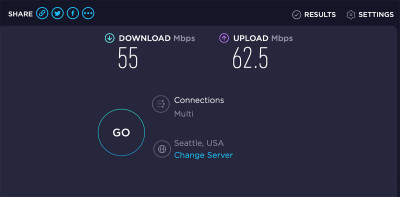
ExpressVPN vs NordVPN: streaming
Both VPNs are great for streaming geo-restricted content, accessing all the platforms I tested. However, NordVPN seemed more stable than ExpressVPN and showed less buffering thanks to its high speeds.
Here’s a table that compares the streaming capabilities of ExpressVPN and NordVPN:
|
NordVPN |
ExpressVPN |
|
|
Netflix |
✅Yes |
✅Yes |
|
BBC iPlayer |
✅Yes |
✅Yes |
|
Amazon Prime |
✅Yes |
✅Yes |
|
Hulu |
✅Yes |
✅Yes |
|
HBO Max |
✅Yes |
✅Yes |
You can use both NordVPN and ExpressVPN to access almost all US streaming platforms, like Netflix, Disney Plus, Amazon Prime, HBO Max, Hulu, and Paramount+. Both of them are also great for accessing UK content like BBC iPlayer, though ExpressVPN will sometimes require you to use its Smart DNS tool. Regardless of which VPN you use for streaming, you’ll always have access to a huge library of online streaming platforms.
Since they both have tons of servers in both the US and the UK, you won’t face any trouble finding a reliable and fast server for streaming geo-restricted content.
Servers and locations
Although NordVPN used to have way less server locations in the past, it now exceeds ExpressVPN's coverage. With NordVPN, you get access to 129 server locations, while with ExpressVPN - 105 server locations.
Here’s a table so you can quickly see the number of servers and locations both VPNs offer:
|
NordVPN |
ExpressVPN |
|
|
Number of servers |
Over 8,300 |
Over 3,000 |
|
Number of countries |
129 |
105 |
While the difference in servers isn't massive, NordVPN covers a few locations that ExpressVPN doesn't. Here are the countries that are only covered by NordVPN: Belize, El Salvador, Greenland, Paraguay, Afghanistan, Angola, Bahrain, Comoros, Iraq, Jordan, Kuwait, Libya, Mauritania, Mozambique, Nigeria, Qatar, Rwanda, Senegal, Somalia, Tunisia.
Platforms, interface, and ease of use
NordVPN and ExpressVPN both have apps for desktop and mobile devices, including PC, Mac, iOS, and Android. In terms of ease of use, I couldn't see much of a difference - both platforms are easy to use and intuitive. However, I have to give a hand to ExpressVPN for its router applet, which makes it easy to set up the VPN on smart TVs.
Here’s a table that summarizes the differences between NordVPN and ExpressVPN in terms of platform, interface, and ease of use:
|
NordVPN |
ExpressVPN |
|
|
Number of devices/simultaneous connections |
10 |
Up to 14 |
|
Desktop compatibility |
Windows, macOS, and Linux |
Windows, macOS, and Linux |
|
Mobile compatibility |
Android and iOS |
Android and iOS |
|
Router compatibility |
Yes (manual setup) |
Yes (router applet) |
|
Browser extensions |
Google Chrome, Firefox, and Edge |
Google Chrome, Firefox, and Edge |
|
Streaming devices |
Android TV, Fire TV, and Apple TV |
Android TV, Fire TV, and Apple TV |
Desktop apps
Both ExpressVPN and NordVPN have apps for Windows PC, macOS, and Linux that are easy to understand even for complete beginners. To connect to a server, all you have to do is click on a fairly large button or a country in the list.
NordVPN has two app version for macOS - one that you can get through the app store and one from the official website. The Apple App Store version has fewer features, so if you're a Mac user, I suggest opting for the official website app.
However, I enjoyed the NordVPN app more than ExpressVPN due to aesthetics. NordVPN has a massive world map on its interface, so you can click anywhere on it and connect to a server instantly.
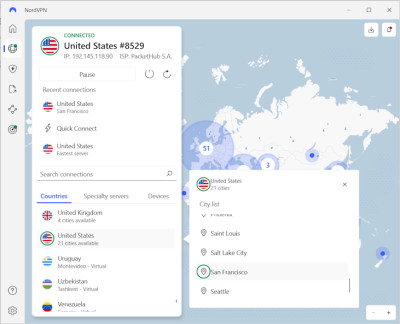
I also liked that NordVPN and ExpressVPN have a GUI for Linux, which not all VPNs have. So, even if you're a Linux user, you don't have to rely on command-line to use the app.
Mobile apps
There's no massive difference between the mobile apps of NordVPN and ExpressVPN. Both are simple to set up and use, just like their desktop counterparts. ExpressVPN has a simple interface with a quick connect button in the middle of the screen.
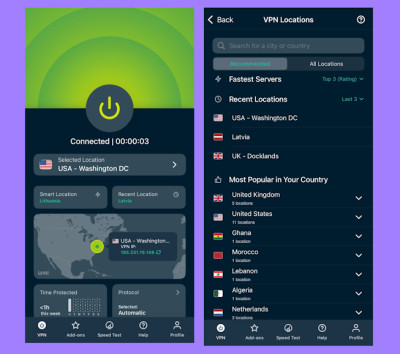
Meanwhile, NordVPN conveniently places specialty servers at the main dashboard so you can easily reach them whenever needed. You can also quickly connect to a recent location.
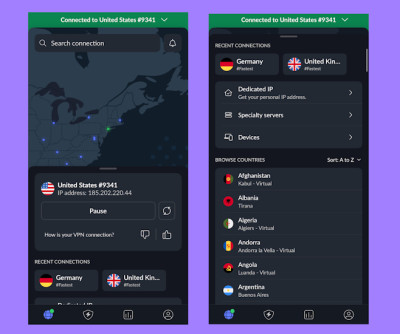
Overall, both NordVPN and ExpressVPN offer great mobile apps that are simple to navigate through. You won't have any issues with the setup or use with any of them.
Customer support
Both VPNs have great customer support, but NordVPN has a 24/7 automated chatbot which works quite well. ExpressVPN has helpful tutorials and guides which are good enough to help users solve most problems.
ExpressVPN and NordVPN both have 24/7 customer support and you can easily email them. Both have online guides for router setup, usage tutorials, and more.
I contacted the customer support of both NordVPN and ExpressVPN to test their capabilities. Although NordVPN's agent replied quicker, both teams were professional and answered all my questions clearly.
ExpressVPN vs NordVPN: which is better?
NordVPN is a better VPN than ExpressVPN in many areas, including security, speed performance, and pricing. Although ExpressVPN has its strenghts, such as a router applet, NordVPN comes with more security features, including Onion over VPN and dark web monitoring.
As for speed, NordVPN performed better during my tests. It showed an average speed retention rate of over 90%, while ExpressVPN was a little below that. Yet, the user experience and customer support are superb with both VPNs. NordVPN and ExpressVPN have user-friendly apps for desktop and mobile devices that are easy to figure out for anyone.
Frequently asked questions
NordVPN is better than ExpressVPN in multiple areas, such as security, pricing, server coverage, and features. It offers such features as Meshnet and built-in Onion over VPN. Plus, NordVPN has 8,300+ servers in 129 countries, while ExpressVPN has 3,000+ servers in 105 countries.
NordVPN is better for torrenting since it has fast P2P servers. While ExpressVPN also has servers optimized for P2P, it isn't as fast. NordVPN retained an average of 92% initial connection speeds while connected to a server, while ExpressVPN - around 88%. Plus, NordVPN offers Onion over VPN servers for extra security.
Yes, NordVPN gives better download speeds than ExpressVPN. On the 60 Mbps connection I tested the VPNs, NordVPN performed giving us around 55 Mbps speed when connected to US-based servers, while ExpressVPN clocked 49 Mbps.
Yes, both NordVPN and ExpressVPN work in China. However, NordVPN is faster and offers additional security features like Onion over VPN and dark web monitoring.
ExpressVPN has better apps as the design is consistent across all platforms and they’re more user-friendly. NordVPN’s app have more features scatered throughout the app, but it still is clean and easy to understand.



